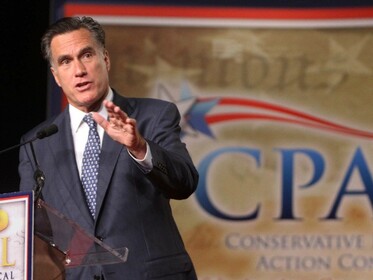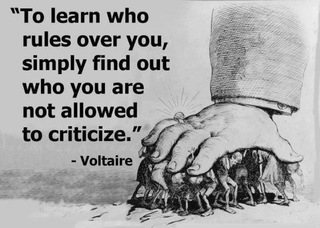 AP Photo/Joe Burbank, Pool AP Photo/Joe Burbank, Pool
American Conservative Union Formally Disinvites Mitt Romney from CPAC
KATHERINE RODRIGUEZ 1 Feb 20201,909 American Conservative Union (ACU) chairman Matt Schlapp formally “disinvited” Sen. Mitt Romney (R-UT) from this year’s Conservative Political Action Conference (CPAC) due to Romney’s vote to call on additional witnesses in President Donald Trump’s impeachment trial. Matt Schlapp✔@mschlappBREAKING: The "extreme conservative" and Junior Senator from the great state of Utah, @SenatorRomney is formally NOT invited to #CPAC2020. “The ‘extreme conservative’ and Junior Senator from the great state of Utah, @SenatorRomney is formally NOT invited to #CPAC2020,” Schlapp tweeted on Friday. Romney, along with Sen. Susan Collins (R-ME), broke away from the party to vote in favor of hearing from additional witnesses. The measure to subpoena additional witnesses and documents in the trial failed in a 51-49 vote after other moderate Republicans voted “no.” The Senate is expected to vote Wednesday on acquitting Trump. CPAC is one of the largest gatherings of conservatives in the country, and Trump has spoken at the event the last three years. Romney also spoke at CPAC in 2012 as a presidential candidate, but the current Utah senator has ruffled the feathers of many conservatives for criticizing the White House administration. This year’s CPAC is scheduled to begin on February 26 at the Gaylord National Resort & Convention Center with Rep. Devin Nunes (R-CA), conservative commentator Mark Levin, and Brexit leader Nigel Farage as some of the speakers on the roster. ___________________________  In this June 12, 2019, file photo, a truck moves around the Oregon state Capitol during a protest against climate bills that truckers say will put them out of business, in Salem, Ore.
AP Photo/Sarah Zimmerman, File In this June 12, 2019, file photo, a truck moves around the Oregon state Capitol during a protest against climate bills that truckers say will put them out of business, in Salem, Ore.
AP Photo/Sarah Zimmerman, File
Up to 600 members of alleged militia groups expected to mobilize to Oregon-Idaho border in effort to protect state GOP lawmakers who fled climate change vote
Nicole Einbinder - Jun. 22, 2019, 3:30 PM I
Following the walk-out, Oregon Gov. Kate Brown deployed state policeto recoup lawmakers. Republican lawmakers and militia members weren't too happy with that order. "We will not stand by and be bullied by the majority party any longer," said Senate Republican Leader Herman Baertschiger, Jr. in a Thursday statement, while Republican state Senator Brian Boquist suggested he would resort to violence if Brown dispatched state troopers. "This is what I told the superintendent," Boquist told local media, referring to Oregon State Police superintendent Travis Hampton. "Send bachelors and come heavily armed. I'm not going to be a political prisoner in the state of Oregon. It's just that simple." Pat Dooris✔@PatDoorisOregon state senator @BrianBoquistGOP said if R's walk out to stop a vote on Cap and Trade and @OregonGovBrown sends state police to bring him back, they should be single and well armed. Your take? 900 5:53 PM - Jun 19, 2019 1,515 people are talking about this Twitter Ads info and privacyMilitia groups are now allegedly threatening violence to protect the Republican senators, prompting the closure of the capitol's Saturday floor session. Democratic Senator Elizabeth Steiner Hayward posted a message on social media on Friday sent from Senate leadership confirming the canceled session, according to the Willamette Week. "The State Police Superintendent just informed the Senate President of a credible threat from militia groups coming to the Capitol tomorrow," the message read. "The Superintendent strongly recommends that no one come to the Capitol and President [Peter] Courtney heeded that advice minutes ago." Capt. Timothy Fox of the Oregon State Police confirmed a possible threat to INSIDER on Saturday. "We have been monitoring information throughout the day that indicates the safety of legislators, staff, and citizen visitors could be compromised if certain threatened behaviors were realized," Fox said. "The OSP and partner agencies are planning accordingly." Militia members across the Pacific Northwest told The Daily Beast on Friday that they are mobilizing to protect the GOP senators. "We're doing what we can to make sure that they're safe and comfortable," said Eric Parker, the president of militia group Real Three Percenters Idaho. Members are "willing to put their own lives in front of these senators' lives," added a source within the Oregon militia movement. That source said that members from the Three Percenters and the Oath Keepers, an independent group based outside of Oregon, are involved in those efforts. A source with Oregon's Three Percenters told INSIDER on Saturday that upwards of 600 people are expected to mobilize, consisting of 21 Oregon III% county groups, five Idaho III% groups, the statewide Nevada III% group, and six independent militias across the state. He emphasized that the Oregon Three Percenters are not affiliated with the national group. He said that while he doesn't anticipate violence or any Three Percenters escalating the situation on the ground, "I would not be surprised if every member of the group is armed." The source told INSIDER That Three Percenters have no intention of showing up for any sort of rally at the capitol, with the majority of members being dispatched to the Oregon-Idaho border. "All of the Oregon Three Percenter's resources are being directed to the protection of the senators at this point," the source told INSIDER. "I'm confident that the bulk of the people that are out to protect these senators at this point will go to any lengths required." ____________________________ |

How to Reclaim the Republic
The New American Video Published on May 8, 2019 Former Virginia House of Delegates member Robert G. Marshall discusses with The New American contributor C. Mitchell Shaw his book "Reclaiming the Republic." Marshall created a guidebook from his 26 years in office about how Americans can restore the United States to the way it operated as originally intended. ___________________________ 
Former Iranian MP Alireza Zakani: Obama Admin Gave Us $1.7 Billion; 1st $400 Million Was Cash In A Suitcase
Tim Brown / May 27, 2019 / 1.1k Of course, the usurper did this! It’s part of him being the criminal fraud that he is: Barry Soetoro, aka Barack Hussein Obama Soetoro Sobarkah. What’s funny is that some media outlets finally came around to realizing it while others continue to reject the idea as some sort of “conspiracy theory.” Washington Times: “America Really Did Have A Manchurian Candidate In The White House”. Well, it was a conspiracy, and everyone who should have dealt with the man were cowards and spineless, impotentplayers who should be held accountable as those silently complicit in his crimes. In the video below, former Iranian MP Alireza Zakani admits that the Obama administration unlawfully gave Iran $1.7 billion and the first $400 million was in cash in a suitcase. Below is a transcript of what Zakani said that is provided by MEMRI TV. Alireza Zakani, a member of the Iranian Majles from 2004 to 2016, said in a May 14, 2019 interview on Ofogh TV (Iran) that during the JCPOA negotiations, Iran also negotiated the issue of its frozen Iranian assets that had been held by the United States. Zakani said that Iran had told the U.S. that a prisoner exchange had not been sufficient and demanded to get its frozen funds with “reasonable interest.” He said that the U.S. agreed and delivered $1.7 billion in four payments – the first of which had been a payment of $400 million in cash in a suitcase. He criticized the Iraniannegotiations team as “weak” and said that Abbas Araghchi’s had been a “disaster” when he arrived at the Majles. Zakani added that the nuclear issue was the least valuable of all the issues that were being negotiated with the Americans, which he said included terrorism, regional affairs, defense, security, human rights, and financial assets. Following are excerpts: Alireza Zakani: Ultimately, we would have come to an understanding [in the nuclear negotiations], but it would have been different than the JCPOA. […] At the same time that the JCPOA was being dealt with by the government’s honorable [negotiations]team, we negotiated with the Americans regarding $400 million in Case B1, which has to do with [Iran’s frozen assets] from the days of the Shah. $400 million of ours that the Americans did not give… What was negotiated? The American spies, including [Iranian-American journalist] Jason Rezaian. We released four spies, and [in exchange]seven people were released from American prison, for starters. It was agreed that seven more would be released at the beginning of the year. Fourteen others were removed from the blacklist. [It was] a total of 28 people. We said this was too little, and it really was. They asked us what we wanted, and we said we want our $400 million which [America] must return with reasonable interest. [Ultimately,] we received $1.7 billion in four parts. They brought us the first part – $400 million –in a suitcase. […] We said that it still was not enough, and they asked what more we wanted. We said that Bank Sepah and Bank Sepah International PLC must be removed from the blacklist. The U.N. Security Council was about to end its session, so the Americans had [all the delegates]sign [the papers]for us one after another. The issue that Trump often slammed Obama for and said he gave Iran money – it was about this $1.7 billion, when we were under the pressure of the sanctions. They gave us cash money.We knew from the beginning that the [Iranian] negotiations team was weak. But could we do anything? No. Interviewer: The government got the votes in the elections… Alireza Zakani: Right. The government got the votes and formed its team. It was totally clear. The fact that the team was weak and its level of expertise… at the time that some of them came to the Majles, their level of knowledge was a disaster. Interviewer: Who, for example? Alireza Zakani: Araghchi. He was a disaster. […] The Americans placed four issues on the table. The nuclear case, the regional and terrorism case, the defense and security case, and the case of human rights and all our assets. These four cases were open. The case that could have brought about a global consensus against us, like it did in 2003, was the nuclear case. Not the regional case, the defense case, or the human rights case – none of these has a global consensus against us. […] [For us,] the nuclear case was worth the least of the four cases. Not that the nuclear case was completely worthless… Interviewer: Compared to the others… Alireza Zakani: Compared to the region and the resistance, compared to internal [affairs]and defense, and compared to human rights and our identity – this case was the least valuable. Obama and his cronies should all face treason charges and if found guilty, which they will be, they should all be hung publicly. Article posted with permission from Sons Of Liberty Media __________________________ 
Full Definition of socialism
1: any of various economic and political theories advocating collective or governmental ownership and administration of the means of production and distribution of goods
|

When the people fear the government, there is tyranny. When the government fears the people, there is liberty.
~~ Thomas Jefferson 
OBAMA WHITE HOUSE DELETED ONLINE SPEECHES ABOUT THE IMMIGRATION CRISIS HOURS BEFORE TRUMP ENTERED OFFICE: REPORT
June 12, 2019 The Obama administration deleted hundreds of speeches and statements on the Immigration and Customs Enforcement (ICE) website just hours before President Donald Trump officially entered office, according to research released Tuesday. A collection of 190 transcripts of speeches on ICE’s website was deleted on Jan. 18 and late in the evening on Jan. 19, 2017, according to research conducted by the Sunlight Foundation, a nonpartisan organization that advocates for government transparency. Statements made by high-ranking ICE officials regarding controversial immigration topics such as sanctuary cities, E-Verify, treatment of detainees, and other issues were included in the reported deletions. “With a couple of clicks of a mouse, access to a federal government web resource containing 12 years of primary source materials on ICE’s history was lost,” the Sunlight Foundation wrote, noting that archived speeches dating back from 2004 were among those deleted. Speeches from former acting ICE Director Thomas Homan, a public supporter of Trump’s immigration policies, were among those prominently included in the deletion list. A February 2016 speech delivered to the Senate Judiciary Committee by Homan was among those removed. Then the executive associate director of Enforcement and Removal Operations, Homan spoke about the “Unaccompanied Minor Crisis,” telling lawmakers how the agency and the Obama White House were working to manage the surge of young illegal children reaching the southern border en masse. It is not yet clear why the Obama White House reportedly deleted these specific transcripts, and ICE did not respond to a request for comment from The Daily Caller News Foundation. While the Sunlight Foundation stated that outgoing administrations make routine changes to their websites, they also noted that some edits may be for “historical or political” purposes. “It is not inconceivable that an outgoing Democratic administration might want to avoid preserving these public stances for future scrutiny,” the Foundation wrote. “The removal of the ICE speeches collection represents the loss of a primary source history of the early days of ICE, dating back to its creation during the George W. Bush administration in 2003.” Follow Jason on Twitter. 
WHAT IS WRONG WITH THE: COUNCIL ON FOREIGN RELATIONS
December 8, 2016 by James Perloff During his presidential campaign, Barack Obama consistently promised Americans “change.” Such promises aren’t new to the voting public. When Jimmy Carter ran for president, he said: “The people of this country know from bitter experience that we are not going to get … changes merely by shifting around the same group of insiders.” And top Carter aide Hamilton Jordan promised: “If, after the inauguration, you find a Cy Vance as Secretary of State and Zbigniew Brzezinski as head of National Security, then I would say we failed. And I’d quit.” Yet Carter selected Vance as Secretary of State and Brzezinski as National Security Adviser; the “same group of insiders” had been shifted around; and Jordan did not quit. Carter’s administration was dominated by members of the Trilateral Commission, which had been founded by Brzezinski and David Rockefeller. In 1980, when Ronald Reagan was campaigning against Carter, he protested: I don’t believe that the Trilateral Commission is a conspiratorial group, but I do think its interests are devoted to international banking, multinational corporations, and so forth. I don’t think that any Administration of the U.S. Government should have the top nineteen positions filled by people from any one group or organization representing one viewpoint. No, I would go in a different direction. Yet after his election, President Reagan picked 10 Trilateralists for his transition team, and included in his administration such Trilateralists as Vice President George Bush, Defense Secretary Caspar Weinberger, U.S. Trade Representative William Brock, and Fed Chairman Paul Volcker. Yet the entire North American membership of the Trilateral Commission has never numbered much over 100. The reason that presidential candidates’ promises of “change” go largely unfulfilled once in office: they draw their top personnel from the same establishment groups — of which the Trilateral Commission is only one. Chief among these groups is the Council on Foreign Relations (CFR), the most visible manifestation of what some have called the American establishment. Members of the council have dominated the administrations of every president since Franklin D. Roosevelt, at the cabinet and sub-cabinet level. It does not matter whether the president is a Democrat or Republican. As we will later see, Barack Obama is no exception to CFR influence. Power Behind the Throne In theory, America’s government is supposed to be “of the people, by the people, for the people.” While this concept rang true in early America, and many individuals still trust in it, the last century has seen the reality of power increasingly shift from the people to an establishment rooted in banking, Wall Street, and powerful multinational corporations. Syndicated columnist Edith Kermit Roosevelt, granddaughter of Teddy Roosevelt, explained: The word “Establishment” is a general term for the power elite in international finance, business, the professions and government, largely from the northeast, who wield most of the power regardless of who is in the White House. Most people are unaware of the existence of this “legitimate Mafia.” Yet the power of the Establishment makes itself felt from the professor who seeks a foundation grant, to the candidate for a cabinet post or State Department job. It affects the nation’s policies in almost every area. Roosevelt added that this group’s goal is “a One World Socialist state governed by ‘experts’ like themselves.” David Rockefeller, the longtime chairman (and now chairman emeritus) of the CFR, acknowledged the role of the establishment in trying to lead America in the one-world direction in his 2002 book Memoirs: For more than a century ideological extremists at either end of the political spectrum have seized upon well-publicized incidents such as my encounter with Castro to attack the Rockefeller family for the inordinate influence they claim we wield over American political and economic institutions. Some even believe we are part of a secret cabal working against the best interests of the United States, characterizing my family and me as “internationalists” and of conspiring with others around the world to build a more integrated global political and economic structure — one world, if you will. If that’s the charge, I stand guilty, and I am proud of it. Two major means the establishment employs for controlling government policy: (1) through its influence within the two major parties and the mass media, it can usually assure that both the Republican and Democratic presidential candidates will be its own hand-picked men; (2) by stacking presidential cabinets with CFR members at key positions — especially those involving defense, finance, foreign policy, and national security — it can assure that America will move in the direction it wants. Since the council’s founding in 1921, 21 secretaries of defense or war, 19 secretaries of the treasury, 17 secretaries of state, and 15 CIA directors have hailed from the Council on Foreign Relations. Background Prior to the CFR’s founding, what Congressman Charles Lindbergh, Sr. (the father of the famous aviator) called the “Money Trust” — a cabal of international bankers including the houses of Rockefeller, Morgan, and Rothschild — conspired to create the Federal Reserve System. Their agents, such as Paul Warburg and Benjamin Strong, who had secretly planned the Fed at a nine-day meeting on Jekyll Island, were then put in charge of the system itself. This gave them control of American interest rates, and, by virtue of this, control of the stock market, as well as the capacity to have the U.S. government spend without limit by having the Fed create money from nothing. The result has been decades of inflation and skyrocketing national debt. (For full details, see the April 13, 2009 New American or Our Monetary Mayhem Began With the Fed.) Not just an accumulation of wealth, but a consolidation of political power was involved. The Money Trust had backed Woodrow Wilson in the presidential elections, and then controlled him through their front man, Edward Mandell House, who lived in the White House. The trust recognized how the power of government could be used to advance their own interests. Wilson, surrounded by the bankers, traveled to the Paris Peace Conference of 1919, which was settling the aftermath of World War I. His chief proposal there, of course, was the League of Nations — a first step toward world government. However, although the League was established by the Versailles Treaty, the United States did not join because the Senate refused to ratify the treaty. In response to this rejection, the bankers’ circle, still in Paris, held a series of meetings and proposed to establish a new organization in the United States, whose purpose would be to lead America into the League. This organization was incorporated in New York City two years later as the Council on Foreign Relations. Architects of a New World Order The CFR’s goal was formation of an incrementally stronger world government. Admiral Chester Ward, former Judge Advocate of the U.S. Navy, was a CFR member for 16 years before resigning in disgust. He stated: “The main purpose of the Council on Foreign Relations is promoting the disarmament of U.S. sovereignty and national independence, and submergence into an all-powerful one-world government.” After World War II, the League’s successor, the United Nations, was born. Contrary to what the public is commonly told, the UN was not founded by nations who had tired of war. The UN was conceived by a group of CFR members in the State Department calling themselves the Informal Agenda Group. They drafted the original proposal for the UN, and secured the approval of President Roosevelt, who then made establishing the UN his highest postwar priority. When the UN held its founding meeting in San Francisco in 1945, 47 of the American delegates were CFR members. Though the UN was not initially set up as a world government, the intent was that it would develop into one over time. John Foster Dulles (CFR), an American delegate to the UN founding meeting who later became Secretary of State under Eisenhower, acknowledged as much in his book War or Peace: “The United Nations represents not a final stage in the development of world order, but only a primitive stage. Therefore its primary task is to create the conditions which will make possible a more highly developed organization.” Two other postwar institutions, the World Bank and International Monetary Fund, were technically created at the 1944 Bretton Woods Conference. But the initial planning was done by the CFR’s Economic and Finance Group, part of their wartime War and Peace Studies Project. The World Bank and IMF act as a loan-guarantee scheme for multinational banks. When a loan to a foreign country goes awry, the World Bank and IMF step in with taxpayer money, ensuring that the private banks continue to receive interest payments. Furthermore, the World Bank and IMF dictate conditions to the countries receiving bailouts, thus giving the bankers a measure of political control over indebted nations. Despite what Americans were told, the postwar Marshall Plan was not invented by General George Marshall, though he did announce it in a 1947 Harvard commencement speech. The Marshall Plan was dreamed up at a CFR study group with David Rockefeller as its secretary. Marshall was simply selected to announce the plan because, as a general, he would be perceived as politically neutral and help garner bipartisan congressional support for the plan. Unknown to the public, Marshall Plan funds were circuitously rerouted by John J. McCloy — appointed U.S. High Commissioner to Germany — to Jean Monnet, founder of the Common Market, which evolved into today’s European Union, a microcosm of world government. McCloy returned home to become chairman of the Council on Foreign Relations in 1953. The tragic Vietnam War was run almost entirely by CFR members. William P. Bundy (CFR) drafted the Tonkin Gulf Resolution before the now-discredited Tonkin Gulf Incident even took place. Bundy’s father-in-law, Dean Acheson (CFR), as leader of a senior team of advisers nicknamed “the Wise Men,” persuaded Lyndon Baines Johnson to dramatically escalate the war beginning in 1965. And Secretary of Defense Robert McNamara (CFR) helped develop the “rules of engagement” (e.g., preventing the Air Force from attacking critical targets) that guaranteed the war’s disastrous prolongation. This generated a huge slide to the left among American college students. When Bundy left the State Department, David Rockefeller appointed him editor of the CFR’s journal Foreign Affairs. And McNamara, one of the leading architects of the Vietnam War debacle, became president of the World Bank. Broadening the Scheme The CFR is not a uniquely American phenomenon. It has counterpart organizations throughout the world — e.g., the Royal Institute of International Affairs in England, the French Institute of International Relations, etc. To help coordinate policy on an international scale, CFR chairman David Rockefeller and Zbigniew Brzezinski founded the Trilateral Commission in 1973. “Trilateral” refers to the coordination of three global regions: North America, Europe, and Asia. The commission’s meetings allow the gathering together of heads of state, banks, multinational corporations, and media. Republican Senator Barry Goldwater called the commission “David Rockefeller’s newest cabal,” and said, “It is intended to be the vehicle for multinational consolidation of the commercial and banking interests by seizing control of the political government of the United States.” The commission, like the annual secretive meetings of the Bilderbergers and the notorious Bohemian Grove, enables the international power elite to privately assemble and plan our destiny. Jimmy Carter was a member of the commission, hand-picked to be president after meeting with Brzezinski and Rockefeller at the latter’s Tarrytown, New York, estate. Carter filled his administration with CFR members and Trilateralists. Indeed, Brzezinski noted in his memoirs that “all the key foreign policy decision makers of the Carter Administration had previously served in the Trilateral Commission.” Carter then embarked on a destructive course of foreign policy that included betraying the Shah of Iran, leading to the installment of Ayatollah Khomeini and the U.S. hostage crisis; betraying President Anastasio Somoza of Nicaragua, resulting in a Marxist dictatorship under the Sandinistas; and betraying Taiwan in order to recognize Communist China — a move previously set up by Richard Nixon’s overtures to China, dictated by his own CFR advisers. Under Bill Clinton (a CFR member who selected 12 CFR members for his cabinet), the United States enacted NAFTA, an economic alliance with Mexico and Canada. This arrangement was created by the establishment, not by the American people, who did not suspect the game being played on them. Not only did NAFTA swamp us with cheap, job-destroying imports, but it was designed to be the foundation for a continental economic union leading to political union. Robert Pastor (CFR), a key architect of North American integration, acknowledged in the January/February 2004 issue of Foreign Affairs: “NAFTA was merely the first draft of an economic constitution for North America.” And Andrew Reding of the World Policy Institute said: “NAFTA will signal the formation, however tentatively, of a new political unit — North America. With economic integration will come political integration. By whatever name, this is an incipient form of international government. Following the lead of the Europeans, North Americans should begin considering formation of a continental parliament.” [Emphasis added.] A similar stratagem had been used against the peoples of Europe — by first deceptively hooking them into an “economic” alliance called the Common Market, which then, requiring common laws to regulate trade, transformed via a series of steps into the European Union, the super-national government of Europe that is swallowing up national sovereignty. Following the initial step enacted under Clinton, President George W. Bush, whose father was a CFR director, moved toward politicizing the NAFTA alliance. On March 23, 2005, he met Mexican President Vicente Fox and Canadian Prime Minister Paul Martin to launch the Security and Prosperity Partnership (SPP), the rudiments of a North American Union. CNN’s Lou Dobbs said of it: “President Bush signed a formal agreement that will end the United States as we know it.” Furthermore, regional alliances such as the European Union and proposed North American Union are not ends, but only steppingstones to world government. As CFR/Trilateralist Zbigniew Brzezinski stated: “We cannot leap into world government in one quick step. The precondition for genuine globalization is progressive regionalization.” In furtherance of this, on April 30, 2007, President Bush stood at the White House beside Angela Merkel, president of the European Council, and José Manuel Barroso, president of the European Commission, and announced the signing of a new agreement to “strengthen transatlantic economic integration.” It called for “joint work in the areas of regulatory cooperation, financial markets, trade and transport security, innovation and technological development, intellectual property rights, energy, investment, competition, services, and government procurement,” and various other steps toward economic integration. But as usual, “economic integration” is the predecessor of political integration. CFR members have dreamed of a political union between the United States and Europe since the 1950s, when the CFR-dominated Atlantic Union Committee promoted a merger they called “Atlantica.” Enter Obama Candidate Barack Obama revealed he would proceed with the Bush initiatives. In a speech in Berlin on July 24, 2008, he stated: That is why the greatest danger of all is to allow new walls to divide us from one another. The walls between old allies on either side of the Atlantic cannot stand. The walls between the countries with the most and those with the least cannot stand. The walls between races and tribes; natives and immigrants; Christian and Muslim and Jew cannot stand. These now are the walls we must tear down…. Yes, there have been differences between America and Europe. No doubt, there will be differences in the future. But the burdens of global citizenship continue to bind us together…. In this new century, Americans and Europeans alike will be required to do more — not less. Partnership and cooperation among nations is not a choice; it is the one way, the only way, to protect our common security and advance our common humanity. Obama had only been president for a little over two months when he traveled to Europe for a series of meetings with European leaders. He attended the G20 Summit, which ended with a tentative agreement to launch a new global financial system, using as the rationale for this major step toward global government the recent Fed- and government-spawned financial meltdown. Henry Kissinger — foreign policy mouthpiece of the establishment for four decades — wrote an article for the January 12, 2009 issue of the International Herald Tribune entitled “The Chance for a New World Order.” He stated: As the new U.S. administration prepares to take office amid grave financial and international crises, it may seem counterintuitive to argue that the very unsettled nature of the international system generates a unique opportunity for creative diplomacy…. Even the most affluent countries will confront shrinking resources. Each will have to redefine its national priorities. An international order will emerge if a system of compatible priorities comes into being…. The alternative to a new international order is chaos. Kissinger also stated on CNBC’s “Squawk on the Street”: “The president-elect is coming into office at a moment when there is upheaval in many parts of the world simultaneously…. His task will be to develop an overall strategy for America in this period when, really, a new world order can be created. It’s a great opportunity, it isn’t just a crisis.” Past statements reveal that the establishment wants a single currency for the world, just as the EU has consolidated its currencies into the “euro.” As far back as the 1944 Bretton Woods Conference, John Maynard Keynes proposed a world currency he dubbed bancor. Richard L. Gardner (CFR) wrote in the Fall 1984 Foreign Affairs: “I suggest a radical alternative scheme for the next century: the creation of common currency for all the industrial democracies and a joint Bank of Issue to determine that Monetary Policy.” In March of this year, Obama and British Prime Minister Gordon Brown met with reporters at the White House. Brown announced that “there is the possibility in the next few months of a global new deal that will involve all the countries of the world in sorting out and cleaning up the banking system.” Obama added that Globalization can be an enormous force for good…. But what is also true is … we still have a 1930s regulatory system in place in most countries designed from the last great crisis, that we’ve got to update our institutions, our regulatory frameworks, so that the power of globalization is channeled for the benefit of ordinary men and women. If trends continue, however, the changes can be expected to benefit a tiny handful of the global elite, not “ordinary men and women.” Further evidence that Obama’s administration will simply continue the globalist agenda is indicated by his appointments. CFR Domination Continues During his campaign, Obama selected the ubiquitous Zbigniew Brzezinski (CFR), promoter of the “regional” approach to world government, as one of his top foreign policy advisors. Obama called Brzezinski “one of our more outstanding thinkers” and “somebody I have learned an immense amount from.” Presumably Brzezinski’s teachings included the world government he advocates. For Treasury Secretary, Obama chose Timothy Geithner: Senior Fellow in International Economics at the CFR, Bilderberger, former head of the New York Federal Reserve, and former employee of both the IMF and Kissinger Associates. One doesn’t get more establishment than that! It is Geithner who is managing the bailout of Wall Street with taxpayer dollars. Assisting Geithner at Treasury in overseeing the auto industry bailout is fellow CFR member Stephen Rattner. For Director of the National Economic Council — a U.S. government agency created by a Bill Clinton executive order — Obama selected Lawrence Summers (CFR, Bilderberger). Former Chief Economist at the World Bank, his last position was at the investment firm of D. E. Shaw & Co, where he earned $5.2 million in one year while working one day per week. Henry Kissinger had said Summers should “be given a White House post in which he was charged with shooting down or fixing bad ideas.” For Defense Secretary, Obama elected to continue with Bush pick Robert Gates (CFR, Bilderberger). During the Carter administration, Gates served as a special assistant to Zbigniew Brzezinski. In 2004, he co-chaired a CFR Task Force on Iran with Brzezinski, who lauded Gates in Time in 2008. Joining Gates in the Defense Department are fellow CFR members Michele Flournoy (Under Secretary of Defense for Policy), Jeh C. Johnson (Defense Department General Counsel), and Kathleen Hicks (Deputy Under Secretary of Defense for Strategy, Plans and Forces). For Secretary of State, Obama chose Hillary Clinton, who has attended the top-secret Bilderberger meetings. Hillary is not a CFR member, but husband Bill is, and her State Department is laden with CFR members, including James B. Steinberg (Deputy Secretary of State), William J. Burns (Under Secretary for Political Affairs), Susan Rice (U.S. Ambassador to the UN), Jacob J. Lew (Deputy Secretary of State for Management and Resources), Todd Stern (Special Envoy for Climate Change), and many others. The Department of Homeland Security, which many Americans fear may turn our country into an Orwellian surveillance society, was conceived before 9/11 by a task force called the U.S. Commission on National Security, nine of whose 12 members belonged to the CFR. The administration of the department under Obama is particularly heavy with CFR members, including Janet Napolitano (Secretary), Jane Holl Lute (Deputy Secretary), Juliette Kayyem (Assistant Secretary, Office of Intergovernmental Programs), and Alan Bersin (Assistant Secretary, Office of International Affairs). Thus the CFR continues to dominate our government’s key areas: finance, defense, foreign policy, and security. To this may be added various other Obama CFR appointees, such as Mona Sutphen (White House Deputy Chief of Staff), Paul Volcker (Chairman, Economic Recovery Advisory Board), Peter Cowhey, (Senior Counsel, Office of U.S. Trade Representative), and Eric Shinseki (Secretary of Veterans Affairs). The Future The idea that Barack Obama became president from a “grass-roots” movement is illusory. American government policy continues to be largely dictated by the rich and the few. This is generally unknown to the public — not because it is a bizarre conspiracy theory, but because the same power elite who run our government, mega-banks, and multinational corporations also run the major media, as an inspection of the CFR membership roster would reveal. Membership in the CFR, of course, is not an automatic condemnation. A few people are added as “window dressing” to give the group distinction and a veneer of diversity. An example is movie star Angelina Jolie. No one suspects Jolie knows much about foreign affairs or is a conspirator for world government. But within the CFR are hardcore globalists who, linked with their foreign counterparts through the Bilderbergers and Trilateral Commission, head the drive for one-world government. Though numerically small (less than 1,000 members during the Kennedy years, less than 4,500 today), this organization has dominated every administration for over seven decades. As long as the CFR controls our government, we can anticipate more of the same: diminishing national sovereignty; free flow of immigration (which confuses national identity and weakens national loyalties); increasing jobs losses through multinational trade agreements; further internationalization of law (Law of the Sea Treaty, Kyoto Protocol, World Court, global taxation, etc.); increasing loss of freedoms in a “surveillance society”; progressive organization of the United States, Mexico, and Canada into a North American Union; and ultimately, broader merger into a world government where all power will be concentrated in the hands of the elite. Eternal vigilance continues to be the price of freedom. Source: The New American Click to set custom HTML
|
Have you ever wonder what Senators are writing books and how do they find the time?
Reference
These books, written by senators who serve in the 115th Congress (2017-2018), range from public policy to fiction to history.
Lamar Alexander
Friends, Japanese and Tennesseans: A Model of U.S.-Japan Cooperation. New York: Harper and Row, 1986.
Going to War in Sailboats: Why Nuclear Power Beats Windmills for America's Green Energy Future. 2010.
Lamar Alexander's Little Plaid Book. Nashville: Rutledge Hill Press, 1998.
Six Months Off: An American Family's Australian Adventure. New York: William Morrow, 1988.
Steps Along the Way: A Governor's Scrapbook. Nashville: Thomas Nelson, 1981.
The Tennesseans: A People and Their Land. Nashville: Thomas Nelson, 1981.
We Know What to Do: A Political Maverick Talks with America. New York: William Morrow, 1995.
Roy Blunt
Jobs without People: The Coming Crisis for Missouri's Workforce: Final Report of the Governor's Council on Literacy. Jefferson City, MO: Governor's Advisory Council on Literacy, October 1989.
Cory Booker
United: Thoughts on Finding Common Ground and Advancing the Common Good. New York: Ballantine, 2016.
Sherrod Brown
Congress from the Inside: Observations from the Majority and the Minority, 3rd ed. Kent, OH: Kent State University Press, 2004.
Myths of Free Trade: Why American Trade Policy Has Failed. New York: New Press, 2004.
Maria Cantwell
Nine and Counting: The Women of the Senate. New York: Perennial, 2001.
Susan M. Collins
Nine and Counting: The Women of the Senate. New York: Perennial, 2001.
Ted Cruz
A Time for Truth: Reigniting the Promise of America. New York: Broadside Books, 2015.
Dianne Feinstein
Nine and Counting: The Women of the Senate. New York: Perennial, 2001.
Al Franken
Al Franken, Giant of the Senate. New York: Twelve, 2017.
I'm Good Enough, I'm Smart Enough, and Doggone It, People Like Me! Affirmations by Stuart Smalley. New York: Dell Publishing, 1992.
Lies and the Lying Liars Who Tell Them: A Fair and Balanced Look at the Right. New York: Dutton, 2003.
Oh, the Things I Know! A Guide to Success, or, Failing That, Happiness. New York: Dutton, 2002.
Rush Limbaugh Is a Big Fat Idiot and Other Observations. New York: Delacorte Press, 1996.
The Truth (With Jokes). New York: Dutton, 2005.
Why Not Me? The Inside Story of the Making and Unmaking of the Franken Presidency. New York: Dell Publishing, 2000.
Kirsten Gillibrand
Off the Sidelines: Raise Your Voice, Change the World. New York: Ballantine Books, 2014.
Lindsey Graham
My Story. Washington, D.C.: Paid for by Lindsey Graham, 2015.
Kamala Harris
Smart on Crime. San Francisco: Chronicle Books, 2009.
Orrin G. Hatch
An American, a Mormon, and a Christian: What I Believe. Cedar Fort, Inc./C F I Distribution , 2012.
The Equal Rights Amendment: Myths and Realities. Savant Press, 1983.
Higher Laws: Understanding the Doctrines of Christ. Salt Lake City: Deseret Book Co., 1995.
Square Peg: Confessions of a Citizen Senator. New York: Basic Books, 2002.
James Inhofe
The Greatest Hoax: How the Global Warming Conspiracy Threatens Your Future. Washington, D.C.: WND Books, 2012.
Angus S. King, Jr.
Governor’s Travels: How I Left Politics, Learned to Back Up a Bus, and Found America. Camden, ME: Down East, 2011.
Amy Klobuchar
The Senator Next Door: A Memoir from the Heartland. New York: Henry Holt and Company, 2015.
Uncovering the Dome. Prospect Heights, IL: Waveland Press, 1982.
Mike Lee
The Freedom Agenda: Why a Balanced Budget Amendment Is Necessary to Restore Constitutional Government. Washington, D.C.: Regnery Publishing, 2011.
Our Lost Constitution: The Willful Subversion of America's Founding Document. New York: Sentinel, 2015.
Why John Roberts Was Wrong about Healthcare: A Conservative Critique of The Supreme Court's Obamacare Ruling. Ebook: Threshold Editions, 2013.
Written Out of History: The Forgotten Founders Who Fought Big Government. New York: Sentinel, 2017.
John McCain
Character Is Destiny: Inspiring Stories Every Young Person Should Know and Every Adult Should Remember. New York: Random House, 2005.
Faith of My Fathers. New York: Random House, 1999.
Hard Call: Great Decisions and the Extraordinary People Who Made Them. New York: Twelve Books, 2007.
Thirteen Soldiers: A Personal History of Americans at War. New York: Simon and Schuster, 2014.
Why Courage Matters: The Way to a Braver Life. New York: Random House, 2004.
Worth the Fighting For: A Memoir. New York: Random House, 2002.
Claire McCaskill
Plenty Ladylike. New York: Simon and Schuster, 2015.
Mitch McConnell
The Long Game: A Memoir. New York: Sentinel, 2016.
Edward J. Markey
Nuclear Peril: The Politics of Proliferation. Cambridge, MA: Ballinger Publishing Company, 1982.
Robert Menendez
Growing American Roots: Why Our Nation Will Thrive as Our Largest Minority Flourishes. New York: New American Library, 2009.
Patty Murray
Nine and Counting: The Women of the Senate. New York: Perennial, 2001.
Bill Nelson
Mission: An American Congressman's Voyage to Space. San Diego: Harcourt Brace Jovanovich, 1998.
Rand Paul
Government Bullies: How Everyday Americans Are Being Harassed, Abused, and Imprisoned by the Feds. New York: Center Street, 2012.
Our Presidents and Their Prayers: Proclamations of Faith by America's Leaders. New York: Center Street, 2015.
Taking a Stand: Moving Beyond Partisan Politics to Unite America. New York: Center Street, 2015.
The Tea Party Goes to Washington. New York: Center Street, 2011.
Rob Portman
Wisdom's Paradise: The Forgotten Shakers of Union Village. Wilmington, OH: Orange Frazer Press, 2004.
Marco Rubio
100 Innovative Ideas for Florida's Future. Washington, D.C.: Regnery Publishing, 2006.
American Dreams: Restoring Economic Opportunity for Everyone. New York: Sentinel, 2015.
An American Son: A Memoir. New York: Sentinel, 2012.
Bernard Sanders (Bernie)
Our Revolution: A Future to Believe In. New York: Thomas Dunne Books, 2016.
Outsider in the House. New York: Verso, 1997.
Outsider in the White House. New York: Verso, 2015.
The Speech: A Historic Filibuster on Corporate Greed and the Decline of Our Middle Class. New York: Nation Books, 2011.
Ben Sasse
The Vanishing American Adult: Our Coming-of-Age Crisis--and How to Rebuild a Culture of Self-Reliance. New York: St. Martin's Press, 2017.
Charles E. Schumer
Positively American: Winning Back the Middle-Class Majority One Family at a Time. Emmaus, PA: Rodale Books, 2007.
Debbie Stabenow
Nine and Counting: The Women of the Senate. New York: Perennial, 2001.
Patrick Toomey
The Road to Prosperity: How to Grow Our Economy and Revive the American Dream. Hoboken, NJ: John Wiley and Sons, 2009.
Elizabeth Warren
All Your Worth: The Ultimate Lifetime Money Plan. New York: Free Press, 2005.
As We Forgive Our Debtors: Bankruptcy and Consumer Credit in America. New York: Oxford University Press, 1980.
Bankruptcy and Revised Article 9: Statutory Supplement. New York: Aspen Law and Business, 2001-2002.
Business Bankruptcy. Washington, DC: Federal Judicial Center, 1993.
Chapter 11: Reorganizing American Businesses: Essentials. New York: Aspen Publishers, 2008.
Comprehensive Commercial Law: Statutory Supplement. New York: Aspen Publishers, 2003.
A Fighting Chance. New York: Metropolitan, Henry Holt and Company, 2014.
The Fragile Middle Class: Americans in Debt. New Haven: Yale University Press, 2000.
The Law of Debtors and Creditors: Text, Cases, and Problems. New York: Aspen Publishers, various editions.
Secured Credit: A Systems Approach . New York: Wolters Kluwer Law and Business, various editions.
This Fight Is Our Fight: The Battle to Save America's Middle Class. New York: Henry Holt and Company, 2017.
The Two-Income Trap: Why Middle-Class Parents Are Going Broke. New York: Basic Books, 2004.
Sheldon Whitehouse
Captured: The Corporate Infiltration of American Democracy. New York: The New Press, 2017.
On Virtues: Quotations and Insight to Live a Full, Honorable, and Truly American Life. Avon, MA: Adams Media, 2012.
____________________________
Reference
These books, written by senators who serve in the 115th Congress (2017-2018), range from public policy to fiction to history.
Lamar Alexander
Friends, Japanese and Tennesseans: A Model of U.S.-Japan Cooperation. New York: Harper and Row, 1986.
Going to War in Sailboats: Why Nuclear Power Beats Windmills for America's Green Energy Future. 2010.
Lamar Alexander's Little Plaid Book. Nashville: Rutledge Hill Press, 1998.
Six Months Off: An American Family's Australian Adventure. New York: William Morrow, 1988.
Steps Along the Way: A Governor's Scrapbook. Nashville: Thomas Nelson, 1981.
The Tennesseans: A People and Their Land. Nashville: Thomas Nelson, 1981.
We Know What to Do: A Political Maverick Talks with America. New York: William Morrow, 1995.
Roy Blunt
Jobs without People: The Coming Crisis for Missouri's Workforce: Final Report of the Governor's Council on Literacy. Jefferson City, MO: Governor's Advisory Council on Literacy, October 1989.
Cory Booker
United: Thoughts on Finding Common Ground and Advancing the Common Good. New York: Ballantine, 2016.
Sherrod Brown
Congress from the Inside: Observations from the Majority and the Minority, 3rd ed. Kent, OH: Kent State University Press, 2004.
Myths of Free Trade: Why American Trade Policy Has Failed. New York: New Press, 2004.
Maria Cantwell
Nine and Counting: The Women of the Senate. New York: Perennial, 2001.
Susan M. Collins
Nine and Counting: The Women of the Senate. New York: Perennial, 2001.
Ted Cruz
A Time for Truth: Reigniting the Promise of America. New York: Broadside Books, 2015.
Dianne Feinstein
Nine and Counting: The Women of the Senate. New York: Perennial, 2001.
Al Franken
Al Franken, Giant of the Senate. New York: Twelve, 2017.
I'm Good Enough, I'm Smart Enough, and Doggone It, People Like Me! Affirmations by Stuart Smalley. New York: Dell Publishing, 1992.
Lies and the Lying Liars Who Tell Them: A Fair and Balanced Look at the Right. New York: Dutton, 2003.
Oh, the Things I Know! A Guide to Success, or, Failing That, Happiness. New York: Dutton, 2002.
Rush Limbaugh Is a Big Fat Idiot and Other Observations. New York: Delacorte Press, 1996.
The Truth (With Jokes). New York: Dutton, 2005.
Why Not Me? The Inside Story of the Making and Unmaking of the Franken Presidency. New York: Dell Publishing, 2000.
Kirsten Gillibrand
Off the Sidelines: Raise Your Voice, Change the World. New York: Ballantine Books, 2014.
Lindsey Graham
My Story. Washington, D.C.: Paid for by Lindsey Graham, 2015.
Kamala Harris
Smart on Crime. San Francisco: Chronicle Books, 2009.
Orrin G. Hatch
An American, a Mormon, and a Christian: What I Believe. Cedar Fort, Inc./C F I Distribution , 2012.
The Equal Rights Amendment: Myths and Realities. Savant Press, 1983.
Higher Laws: Understanding the Doctrines of Christ. Salt Lake City: Deseret Book Co., 1995.
Square Peg: Confessions of a Citizen Senator. New York: Basic Books, 2002.
James Inhofe
The Greatest Hoax: How the Global Warming Conspiracy Threatens Your Future. Washington, D.C.: WND Books, 2012.
Angus S. King, Jr.
Governor’s Travels: How I Left Politics, Learned to Back Up a Bus, and Found America. Camden, ME: Down East, 2011.
Amy Klobuchar
The Senator Next Door: A Memoir from the Heartland. New York: Henry Holt and Company, 2015.
Uncovering the Dome. Prospect Heights, IL: Waveland Press, 1982.
Mike Lee
The Freedom Agenda: Why a Balanced Budget Amendment Is Necessary to Restore Constitutional Government. Washington, D.C.: Regnery Publishing, 2011.
Our Lost Constitution: The Willful Subversion of America's Founding Document. New York: Sentinel, 2015.
Why John Roberts Was Wrong about Healthcare: A Conservative Critique of The Supreme Court's Obamacare Ruling. Ebook: Threshold Editions, 2013.
Written Out of History: The Forgotten Founders Who Fought Big Government. New York: Sentinel, 2017.
John McCain
Character Is Destiny: Inspiring Stories Every Young Person Should Know and Every Adult Should Remember. New York: Random House, 2005.
Faith of My Fathers. New York: Random House, 1999.
Hard Call: Great Decisions and the Extraordinary People Who Made Them. New York: Twelve Books, 2007.
Thirteen Soldiers: A Personal History of Americans at War. New York: Simon and Schuster, 2014.
Why Courage Matters: The Way to a Braver Life. New York: Random House, 2004.
Worth the Fighting For: A Memoir. New York: Random House, 2002.
Claire McCaskill
Plenty Ladylike. New York: Simon and Schuster, 2015.
Mitch McConnell
The Long Game: A Memoir. New York: Sentinel, 2016.
Edward J. Markey
Nuclear Peril: The Politics of Proliferation. Cambridge, MA: Ballinger Publishing Company, 1982.
Robert Menendez
Growing American Roots: Why Our Nation Will Thrive as Our Largest Minority Flourishes. New York: New American Library, 2009.
Patty Murray
Nine and Counting: The Women of the Senate. New York: Perennial, 2001.
Bill Nelson
Mission: An American Congressman's Voyage to Space. San Diego: Harcourt Brace Jovanovich, 1998.
Rand Paul
Government Bullies: How Everyday Americans Are Being Harassed, Abused, and Imprisoned by the Feds. New York: Center Street, 2012.
Our Presidents and Their Prayers: Proclamations of Faith by America's Leaders. New York: Center Street, 2015.
Taking a Stand: Moving Beyond Partisan Politics to Unite America. New York: Center Street, 2015.
The Tea Party Goes to Washington. New York: Center Street, 2011.
Rob Portman
Wisdom's Paradise: The Forgotten Shakers of Union Village. Wilmington, OH: Orange Frazer Press, 2004.
Marco Rubio
100 Innovative Ideas for Florida's Future. Washington, D.C.: Regnery Publishing, 2006.
American Dreams: Restoring Economic Opportunity for Everyone. New York: Sentinel, 2015.
An American Son: A Memoir. New York: Sentinel, 2012.
Bernard Sanders (Bernie)
Our Revolution: A Future to Believe In. New York: Thomas Dunne Books, 2016.
Outsider in the House. New York: Verso, 1997.
Outsider in the White House. New York: Verso, 2015.
The Speech: A Historic Filibuster on Corporate Greed and the Decline of Our Middle Class. New York: Nation Books, 2011.
Ben Sasse
The Vanishing American Adult: Our Coming-of-Age Crisis--and How to Rebuild a Culture of Self-Reliance. New York: St. Martin's Press, 2017.
Charles E. Schumer
Positively American: Winning Back the Middle-Class Majority One Family at a Time. Emmaus, PA: Rodale Books, 2007.
Debbie Stabenow
Nine and Counting: The Women of the Senate. New York: Perennial, 2001.
Patrick Toomey
The Road to Prosperity: How to Grow Our Economy and Revive the American Dream. Hoboken, NJ: John Wiley and Sons, 2009.
Elizabeth Warren
All Your Worth: The Ultimate Lifetime Money Plan. New York: Free Press, 2005.
As We Forgive Our Debtors: Bankruptcy and Consumer Credit in America. New York: Oxford University Press, 1980.
Bankruptcy and Revised Article 9: Statutory Supplement. New York: Aspen Law and Business, 2001-2002.
Business Bankruptcy. Washington, DC: Federal Judicial Center, 1993.
Chapter 11: Reorganizing American Businesses: Essentials. New York: Aspen Publishers, 2008.
Comprehensive Commercial Law: Statutory Supplement. New York: Aspen Publishers, 2003.
A Fighting Chance. New York: Metropolitan, Henry Holt and Company, 2014.
The Fragile Middle Class: Americans in Debt. New Haven: Yale University Press, 2000.
The Law of Debtors and Creditors: Text, Cases, and Problems. New York: Aspen Publishers, various editions.
Secured Credit: A Systems Approach . New York: Wolters Kluwer Law and Business, various editions.
This Fight Is Our Fight: The Battle to Save America's Middle Class. New York: Henry Holt and Company, 2017.
The Two-Income Trap: Why Middle-Class Parents Are Going Broke. New York: Basic Books, 2004.
Sheldon Whitehouse
Captured: The Corporate Infiltration of American Democracy. New York: The New Press, 2017.
On Virtues: Quotations and Insight to Live a Full, Honorable, and Truly American Life. Avon, MA: Adams Media, 2012.
____________________________


